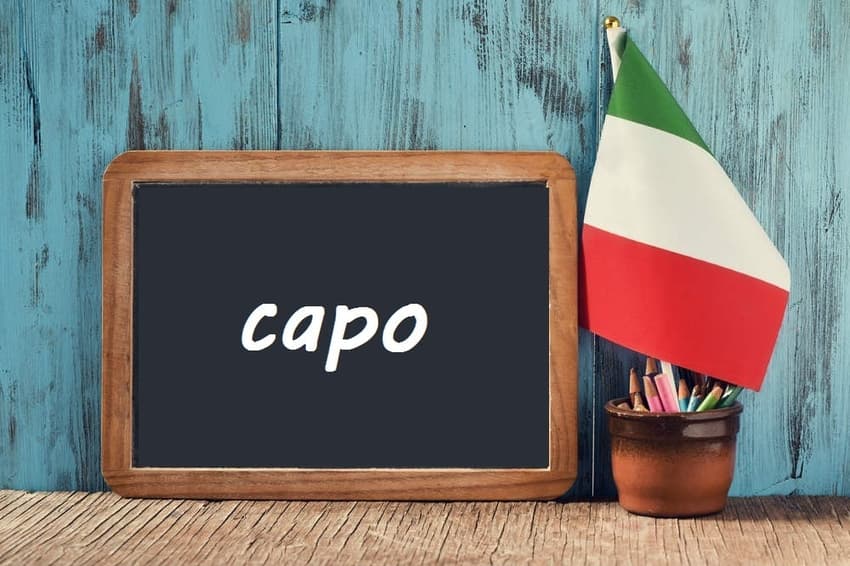
Italian word of the day: 'Capo'

This little word has four letters and a whole lot of different meanings.
Capo means 'head', but usually in a metaphorical sense. You can hear how to pronounce it in the clip below:
It comes from the Latin word caput, which meant 'head' in the anatomical sense and in a few figurative senses too (for example, the leader of a group, or the origin of a river).
In some Italian dialects, capo is still used to mean 'head', but more commonly you'll hear testa (which originally comes from a Latin word meaning 'pot'). However, capo still pops up in a few frequently heard set phrases, such as da capo a piedi (from head to toe, or literally 'head to feet').
Usually though, capo usually refers to a person in modern Italian. When used on its own, it translates as 'boss', but you can also use it as part of a phrase such as il capo di stato (the head of state) or il capo del dipartimento (the head of the department).
In commonly used phrases, sometimes it forms compound nouns: redattore capo and caporedattore are two ways of saying 'editor in chief' while capoluogo (literally 'head place') refers to capital cities or towns of a region. And capo is also sometimes used to high-ranking mafia members, as a shortening of capodecina, which literally means 'head of ten'.
Non importa se sei il capo del dipartimento
It doesn't matter if you're the head of the department
In Italia il presidente è il capo di stato
In Italy, the president is the head of state
Il mio capo è impaziente
My boss is impatient
But that's not all. Capo is also used in a metaphorical sense, in which case it means 'head', 'top', 'end' or 'start'. Musicians will be familiar with the term da capo ('from the top') while anyone who's spent the festive season in Italy might know that Capodanno (literally 'head of the year') means New Year's Day.
You can also talk about sitting at the capo del tavolo (head of the table) or andare in capo al mondo ('to go to the ends of the earth') for someone or something.
And capo can also mean 'item' or 'piece' in certain contexts, of which the most common is probably capo di abbigliamento (item of clothing).
Do you have a favourite Italian word you'd like us to feature? If so, please email our editor Jessica Phelan with your suggestion.
Comments
See Also
Capo means 'head', but usually in a metaphorical sense. You can hear how to pronounce it in the clip below:
It comes from the Latin word caput, which meant 'head' in the anatomical sense and in a few figurative senses too (for example, the leader of a group, or the origin of a river).
In some Italian dialects, capo is still used to mean 'head', but more commonly you'll hear testa (which originally comes from a Latin word meaning 'pot'). However, capo still pops up in a few frequently heard set phrases, such as da capo a piedi (from head to toe, or literally 'head to feet').
Usually though, capo usually refers to a person in modern Italian. When used on its own, it translates as 'boss', but you can also use it as part of a phrase such as il capo di stato (the head of state) or il capo del dipartimento (the head of the department).
In commonly used phrases, sometimes it forms compound nouns: redattore capo and caporedattore are two ways of saying 'editor in chief' while capoluogo (literally 'head place') refers to capital cities or towns of a region. And capo is also sometimes used to high-ranking mafia members, as a shortening of capodecina, which literally means 'head of ten'.
Non importa se sei il capo del dipartimento
It doesn't matter if you're the head of the department
In Italia il presidente è il capo di stato
In Italy, the president is the head of state
Il mio capo è impaziente
My boss is impatient
But that's not all. Capo is also used in a metaphorical sense, in which case it means 'head', 'top', 'end' or 'start'. Musicians will be familiar with the term da capo ('from the top') while anyone who's spent the festive season in Italy might know that Capodanno (literally 'head of the year') means New Year's Day.
You can also talk about sitting at the capo del tavolo (head of the table) or andare in capo al mondo ('to go to the ends of the earth') for someone or something.
And capo can also mean 'item' or 'piece' in certain contexts, of which the most common is probably capo di abbigliamento (item of clothing).
Join the conversation in our comments section below. Share your own views and experience and if you have a question or suggestion for our journalists then email us at [email protected].
Please keep comments civil, constructive and on topic – and make sure to read our terms of use before getting involved.
Please log in here to leave a comment.